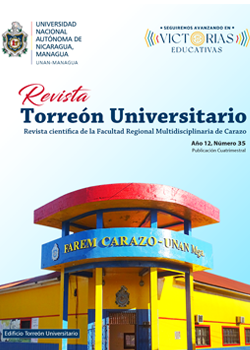Good practices in entrepreneurship from universities. systematization of entrepreneurship in the Multidisciplinary Regional Faculty of Carazo, UNAN - Managua
DOI:
https://doi.org/10.5377/rtu.v12i35.16983Keywords:
Entrepreneurship, Innovation, Entrepreneurial cultureAbstract
This document contains a description of the 23-year history of the Multidisciplinary Regional Faculty of Carazo, training young people with a creative, innovative vision, through an entrepreneurial culture. The description is from personal experience as a student participating in the Entrepreneurship Fair I during 1998, as an entrepreneur during 1999 and as a teacher since 2020.
Since its inception , an entrepreneurial culture has been promoted in students of this faculty, thanks to the correct vision of directors and teachers, first of all in the economic sciences department and currently in all careers and programs such as Universidad en el Campo. There have been university fairs for entrepreneurs, multidisciplinary research to strengthen the business plans established enterprises, business plan designs with a focus on innovation and entrepreneurship so that students consider them as an alternative for generating income.
Through the extension, the faculty has transcended in train strategic social groups on entrepreneurship, it has participated in international and national competitions, obtaining much recognition, responding to the needs of the contexts at different times. Achieving significant influence on the sustainable political, economic and social development of the country.
Downloads
References
Barrios-Hernández, K., & Oliviero-Vega, E. (2020). Relación Universidad-Empresa-Estado. Un análisis desde las instituciones de educación superior de Barranquilla-Colombia para el desarrollo de su capacidad de innovación. Formación Universitaria, 13(2), 21-28.
Barnechea, M y Morgan, M. (2007). El conocimiento desde la práctica y una propuesta de método de sistematización de experiencias, Lima.
Duarte, Tito, y Ruiz (2009). Emprendimiento, Una Opción para el Desarrollo. Scientia EtTechnica, XV(43),326-331. ISSN: 0122-1701. Disponible en: https://www.redalyc.org/articulo.oa?id=84917310058
Fayolle, Gailly, and Lassas‐Clerc. (2006), "Assessing the impact of entrepreneurship education programmes: a new methodology", Journal of European Industrial Training, Vol. 30 No. 9, pp. 701-720. https://doi.org/10.1108/03090590610715022.
Liñan, F. (2004). Intention based models of entrepreneurship education. Piccolla
Impresa/Small Business, 3, 11-35.
Moreno, N. (2019). Emprendimiento; Educación Superior; Docentes del Siglo XXI. Licenciatura en Educación Física y Deporte. Escuela y Sociedad. Corporación Universitaria CENDA. Bogotá Colombia.
Ruiz del Castillo, A. (2003) “Educación superior y globalización. México: Plaza y
Valdes.
Sánchez, M., y Cáceres, J. (2015). La idea de universidad del cardenal John Henry
Newman.Cauriensia, Vol. X, 2015 – 335-358, Universidad de Extremadura.
Torres, A. (1996), “La sistematización como investigación interpretativa crítica: entre la teoría y la práctica”, Mimeo, Santiago de Chile.
UNAN-Managua. (2011). Modelo educativo, normativa y metodología para la planificación curricular. Managua: Editorial Universitaria.
Published
How to Cite
Issue
Section
License
Copyright (c) 2023 National Autonomous University of Nicaragua

This work is licensed under a Creative Commons Attribution-NonCommercial-NoDerivatives 4.0 International License.
The authors who publish in this journal agree to the following terms.
- The author or authors of the articles, essays or research grant the National Autonomous University of Nicaragua, Managua (UNAN-Managua) the editing rights (copyright) of the submitted work, therefore the University has the exclusive right to publish the article for the entire copyright period.
- These copyrights/authors authorize Torreón Universitario Magazine and the University to edit and disseminate/publish the article in said Magazine, including printed and electronic reproduction, storage, retrieval and any other type of publication, and sources of secondary information as services. of summaries and databases, they also empower it to protect the article against unauthorized use for dissemination by printed or electronic media (PDF, HTML, EPUB, XML or others).
License for use of content
The magazine uses the Creative Commons Attribution-NonCommercial-NoDerivs 4.0 International License.
Under this statement:

This journal is licensed under a Creative Commons Attribution-NonCommercial-NoDerivatives 4.0 International License. It can be copied, distributed and transmitted publicly as long as the author and source are cited (Revista Torreón Universitario), it should not be modified or used for any commercial purpose. The full license can be found at http://creativecommons.org/licenses/by-nc-nd/4.0/.



